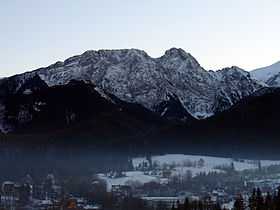Giewont
| Giewont | |
|---|---|
 | |
| Elevation | 1,895 m (6,217 ft) |
| Location | |
| Location | Poland |
| Range | Western Tatras |
| Coordinates | 49°15′02″N 19°56′02″E / 49.25056°N 19.93389°ECoordinates: 49°15′02″N 19°56′02″E / 49.25056°N 19.93389°E |
| Climbing | |
| First ascent | 1830 |
| Easiest route | South |
Giewont (pronounced Gyeh-vont) is a mountain massif in the Tatra Mountains of Poland, and is 1,895 metres AMSL at its highest.
It comprises three peaks (all m/metres in AMSL):
- Small Giewont - (Polish Mały Giewont, 1,728 m)
- Great Giewont - (Wielki Giewont, 1,895 m)
- Long Giewont - (Długi Giewont, 1,867 m).
There is a mountain pass located between Great and Long Giewont, known as Szczerba (1,823 m). It is located between the valleys (doliny) of Kondratowa, Małej Łąki and Strążyska. Long Giewont and Great Giewont are situated at a higher altitude than the nearby town of Zakopane, making them clearly visible from that city.
On Great Giewont, there is a 15 m steel cross that is the site of many religious pilgrimages. Unfortunately, the area is also notorious for its hazardous nature during thunderstorms, so this should be taken into consideration when traveling to that location.
Geologically, Giewont is composed of dolomite and limestone caves, as well as gneiss and granite in the southern section.
The first recorded ascent to Giewont's summit was undertaken in 1830 by Franciszek Herbich and Aleksander Zawadzki (the 19th century explorer, not the 20th century communist). The first winter ascent of Giewont occurred in 1904 by a group of five mountaineers led by Mariusz Zaruski.
Giewont lies in the area of the Polish Tatra National Park (Tatrzański Park Narodowy). In Polish folklore it is associated with a legend about oversleeping knights, who will awake when Poland is in danger. The profile of the mountains is similar to a lying knight, wherein the Long Giewont is the knight's torso, and the Great Giewont is the knight's face as viewed from the side (the three 'peaks' being the chin, the nose, and the eyebrow). The image of Giewont as viewed from the south (see below) makes the profile easy to discern.
-

View from the East
-

Great Giewont - view from the West
-

-

-
Giewont (massif) - view from the South
External links
| Wikimedia Commons has media related to Giewont. |
- Zakopane - Giewont webcam
- "Giewont". SummitPost.org. http://www.summitpost.org/page/153793.
- Giewont webcam - click "Day at a Glance" if night.
